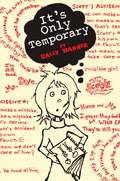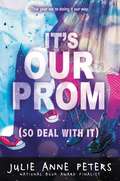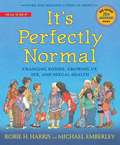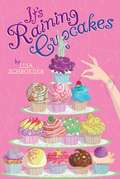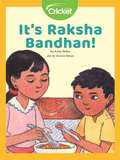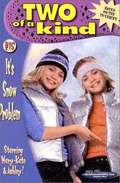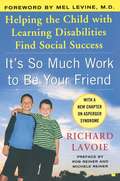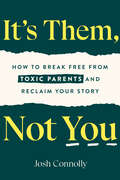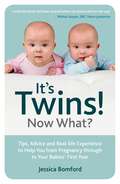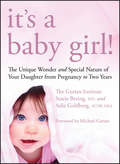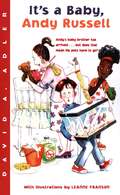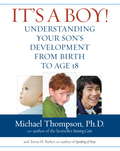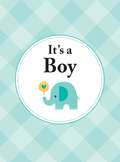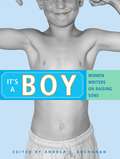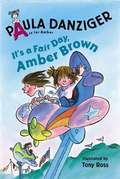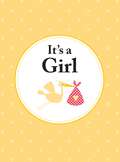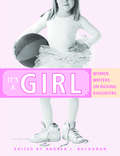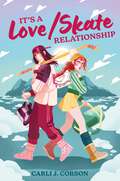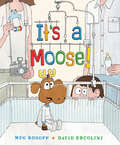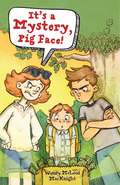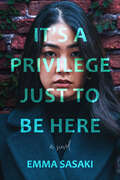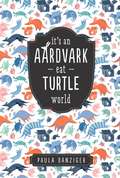- Table View
- List View
It's Only Temporary
by Sally WarnerA novel in words and sketches. ?It?s only temporary,? twelve-year-old Skye McPhee writes in her sketchbook after being shipped off to her gran?s in Sierre Madre, California. After all, her parents have their hands full taking care of her older brother, who?s been severely injured in a car accident. So now Skye is in a new school sketching new kids and trying to stay invisible until she can return home. But her new life starts turning out better than she hoped; she?s making cool friends, and being away from her brother is actually drawing her closer to him. And then her sketchbook disappears and everything changes. Suddenly, Skye realizes that she doesn?t want her life in Sierra Madre to be temporary after all. But does she have a choice? .
It's Our Prom (So Deal With It)
by Julie Anne PetersWhen Azure's principal gives her the chance to turn the school's traditional (and boring) senior prom into an event that will appeal to everyone, not just the jocks and cheerleaders, she jumps at the opportunity. Soon Azure manages to convince her best friends, Luke and Radhika, to join the prom committee as well.Facing heavy opposition and admittedly clueless about prom logistics, the three friends are nonetheless determined to succeed -- if Luke's and Azure's secret crushes on Radhika don't push the committee members, and their friendships, to the breaking point first.Told in two voices and filled with comical missed connections, It's Our Prom (So Deal With It) explores the ups and downs of planning an alternative prom -- while dealing with an unrequited crush on your best friend -- and shines with National Book Award finalist Julie Anne Peters's unmistakable wit and insight.
It's Perfectly Normal: Changing Bodies, Growing Up, Sex, and Sexual Health (The family Library)
by Robie H. HarrisWhen young people have questions about sex, real answers can be hard to find. Providing accurate, unbiased answers to nearly every imaginable question, from conception and puberty to birth control and AIDS, It's Perfectly Normal offers young people the information they need — now more than ever — to make responsible decisions and to stay healthy. Already used as a trusted resource in twenty-five countries around the world (and translated into twenty-one languages), this book marks its tenth anniversary with a thoroughly updated edition that includes information on such topics as birth control, hepatitis, HIV, and adoption, among others. This definitive edition also reflects the recent input of parents, teachers, librarians, clergy, scientists, health professionals, and young readers themselves. Back matter includes an index and a note to the reader.
It's Raining Cupcakes
by Lisa SchroederTwelve-year-old Isabel is dying to get out of her small town of Willow, Oregon, and travel like her best friend, Sophie. But when Isabel's mother decides to open up a cupcake shop across town, Isabel is once again stuck in Willow for the summer...until she learns of a baking contest where the finalists get an all-expenses paid trip to New York City to compete in the final bake-off. But Sophie is also entering the contest, and Isabel's mother has reservations. Can Isabel finally realize her dreams of leaving Willow without hurting two of the most important people in her life?
It's Raksha Bandhan!
by Anna NeherTomorrow is Raksha Bandhan, Brothers and Sisters Day, when kids in India show their love for their brothers and sisters!
It's Snow Problem (Mary-Kate and Ashley, Two of a Kind Diaries)
by Nancy ButcherHans Jensen is tall, blond, and gorgeous -- and thinks he's the best at everything. When he signs up for every ski race in the White Oak/Harrington Winter Festival, Mary-Kate does too. Hans isn't the only super-athlete around -- and she's going to prove it!But then Mary-Kate gets into major trouble -- and is thrown off all the teams! Can Ashley help her sister get back on -- or is Mary-Kate out of the race for good?
It's So Much Work to Be Your Friend: Helping the Child with Learning Disabilities Find Social Success
by Richard LavoieAs any parent, teacher, coach, or caregiver of a learning disabled child knows, every learning disability has a social component. The ADD child constantly interrupts conversations and doesn't follow directions. The child with visual-spatial issues loses his belongings and causes his siblings to be late to school. The child with paralinguistic difficulties appears stiff and wooden because she fails to gesture when she talks. These children are socially out of step with their classmates and peers, and often they are ridiculed or ostracized for their differences. A successful social life is immeasurably important to a child's happiness, health, and development, but until now, no book has provided practical, expert advice on helping learning disabled children achieve social success. For more than thirty years, Richard Lavoie has lived with and taught learning disabled children. His bestselling PBS videos, including How Difficult Can This Be?: The F.A.T. City Workshop, and his sellout lectures and workshops have made him one of the most popular and respected experts in the field. At last, Rick's pioneering techniques for helping children achieve a happy and successful social life are available in book form. It's So Much Work to Be Your Friend offers practical strategies to help learning disabled children ages six through seventeen navigate the treacherous social waters of their school, home, and community. Rick examines the special social issues surrounding a wide variety of learning disabilities, including ADD and other attentional disorders, anxiety, paralinguistics, visual-spatial disorders, and executive functioning. Then he provides proven methods and step-by-step instructions for helping the learning disabled child through almost any social situation, including choosing a friend, going on a playdate, conducting a conversation, reading body language, overcoming shyness and low self-esteem, keeping track of belongings, living with siblings, and adjusting to new settings and situations. Perhaps the most important component of this book is the author's compassion. It comes through on every page that Rick feels the intensity with which children long for friends and acceptance, the exasperation they can cause in others, and the joy they feel in social connection. It's So Much Work to Be Your Friend answers the most intense yet, until now, silent need of the parents, teachers, and caregivers of learning disabled children -- or anyone who is associated with a child who needs a friend.
It's Them, Not You: How to Break Free from Toxic Parents and Reclaim Your Story
by Josh ConnollyA life-affirming manual on how to confront toxic family dynamics and find emotional freedom from your past.How many times have you heard that family is sacred, even when your reality is different? Resilience and well-being coach Josh Connolly knows statements like &“You&’ll miss them when they&’re gone&” or &“Blood is thicker than water&” doesn&’t apply to everyone. With candor and compassion, he tackles the harsh reality of toxic family dynamics and provides the tools you need to deal with emotionally immature parents It's Them, Not You helps you get unstuck and overcome past trauma, with: A deeply validating breakdown of how toxic parents operate and empowering tips to set clear boundaries that stick A step-by-step recovery process that combines breathwork with inner child healing and other therapeutic methodologies. Exercises and journaling prompts that support cognitive and emotional healing with deep reflection and self-compassion. Links to videos for guided conscious breathwork sessions to reconnect the mind and body and release stuck trauma safely. Whether your solution is to go &“no contact,&” place new boundaries, or reconnect with community, this book is the ultimate handbook to reclaim your agency and freedom.
It's Twins! Now What?: Tips, Advice and Real-life Experience to Help You from Pregnancy through to Your Babies' First Year
by Jessica BomfordWhether the news comes as a shock or a delightful surprise, one thing is for certain: having twins is going to change your life. Packed with advice from professionals and anecdotes from fellow twin parents, this book will be your go-to guide to help you navigate the first year with twins, from birth and beyond.
It's Us: Participant's Guide
by Nicole JohnsonIt's the people we love the most who have the greatest potential to hurt us. Our relationships with our families are complex and, for many, extremely painful. Whether you have a seemingly happy family or not, the truth is, no family is perfect. But there is good news in spite of the ups and downs of our family lives. God opens wide his arms, welcoming us again and again into His family, His acceptance, and His love. The It's Us study helps you to see this part of God--His fatherly desire to see you whole and healed and restored. Featuring "live" dramas from the REVOLVE tour in combination with Bible study, the Reel to Real Interactive Drama-Based Study Series addresses the questions and issues--both series and frivolous--that hit at the heart of teens. Designed for individual or group study, the It's Us participant's guide helps individuals and groups explore what's been exposed through the dramas and dig deeper into how to live differently in this changing world. Participant's guide features:Questions, Bible study, and activities for group or individual studyReal-life stories from teensTips for youth group leadersActivies to be artsy and interactive with the topicResources & itunes list (websites, books, online videos, and music related to the topic)For use with the It's Us DVD-Based Study (ISBN 9781418546373).
It's a Baby Girl!
by Michael Gurian Stacie Bering Adie Goldberg The Gurian InstituteVery practical science based tips and guidelines and stories for moms and dads of baby girls. Including: <ul> <li>Why you need a book just about girls. The very different health issues, genetic predisposition, hard wiring, neurological and biological development of girls, including unique strengths and weaknesses.</li> <li>How to understand the core nature of your girl and nourish it through problems of crying, fussing, eating, sleeping, attaching and other key issues during the first 12 months of life.</li> <li>Warm hearted stories about girls and tips from real moms, and a preview of what's to come for girls as they become toddlers, preschool kids, pubescent and beyond.</li> </ul>
It's a Baby, Andy Russell
by David A. Adler Leanne FransonWhile Andy Russell's parents are at the hospital with his newborn baby brother, Andy is having big problems at home. His strange aunt Janet has come to babysit, and she's on a mission to rid the house of germs in preparation for the baby. Andy is convinced his aunt wants him to clean all of his "germy" pets . . . right out of the house! Award-winning author David A. Adler's sixth book in the Andy Russell series is filled with hilarious misunderstandings, warm reunions, and a sweet new addition to the Russell family.
It's a Boy! Your Son's Development from Birth to Age 18
by Michael Thompson Teresa H. BarkerThis upbeat, authoritative, and reassuring guide shows how a boy's inner life progresses through infancy, childhood, and adolescence, providing expert advice on his developmental, psychological, social, and academic life.
It's a Boy: The Perfect Gift for Parents of a Newborn Baby Son
by Summersdale PublishersCongratulations!It’s a beautiful baby boy! You’re at the beginning of an incredible adventure together, and you’re in good company – parents across the ages have captured this experience in memorable words. Discover some of the finest expressions of love and wisdom in this little book of quotations to celebrate the arrival of your amazing son.
It's a Boy: The Perfect Gift for Parents of a Newborn Baby Son
by Summersdale PublishersCongratulations!It’s a beautiful baby boy! You’re at the beginning of an incredible adventure together, and you’re in good company – parents across the ages have captured this experience in memorable words. Discover some of the finest expressions of love and wisdom in this little book of quotations to celebrate the arrival of your amazing son.
It's a Boy: Women Writers on Raising Sons
by Andrea J. BuchananThe most popular question any pregnant woman is asked - aside from "When are you due?" - has got to be "Are you having a girl or a boy?" When author Andrea Buchanan, already a mom to a little girl, was pregnant with her second child, she marveled at the response of friends and total strangers alike: "Boys are wonderful," "Boys are so much better than girls," "Boys love their mothers differently than girls." This constant refrain led her to explore the issue herself, with help from her fellow writers and moms, many of whom had had the same experience.The result is It's A Boy, a wide-ranging, often-humorous, and honest collection of essays about the experience of mothering boys. Taking on topics like aggression, parenting a teenage boy, and wishing for a daughter but getting a son, It's A Boy explores what it's like to mother sons and how that experience may be different, but no less satisfying, than mothering girls.
It's a Girl: The Perfect Gift for Parents of a Newborn Baby Daughter
by Summersdale PublishersCongratulations!It’s a beautiful baby girl! You’re at the start of an amazing adventure together, and you’re in good company – over the years, many parents have captured this experience in memorable words. Discover some of the best expressions of wisdom and love in this little book of quotations to celebrate the arrival of your darling daughter.
It's a Girl: The Perfect Gift for Parents of a Newborn Baby Daughter
by Summersdale PublishersCongratulations!It’s a beautiful baby girl! You’re at the start of an amazing adventure together, and you’re in good company – over the years, many parents have captured this experience in memorable words. Discover some of the best expressions of wisdom and love in this little book of quotations to celebrate the arrival of your darling daughter.
It's a Girl: Women Writers on Raising Daughters
by Andrea J. BuchananThe most popular question any pregnant woman is asked - aside from "When are you due?" - has got to be "Are you having a girl or a boy?" When author Andrea Buchanan was pregnant with her daughter, she was thrilled to be expecting a girl. Some people were happy for her; visions of flouncy pink dresses and promises of mother-daughter bonding were the predictable responses. Other people, though, were concerned: "Is your husband OK with that?" "You can try again." "Girls are tough." This mixed message led her to explore the issue herself, with help from her fellow writers and moms, many of whom had had the same experience. As she did in It's a Boy: Women Writers on Raising Sons, Buchanan and her contributors take on what it's really like to raise a child-in this case, a girl-from babyhood to adulthood.It's a Girl, is a wide-ranging, often humorous, and honest collection of essays about the experience of the mother-daughter bond, taking on topics like "princess power" ("Shining, Shimmering, Splendid"), adding a girl to a brood of boys ("Confessions of a Tomboy Mom"), dealing with a daughter's eating disorder ("The Food Rules"), and mothering "hardcore mini-feminists" ("Tough Girls").
It's a Love/Skate Relationship
by Carli J. CorsonFans of Rachael Lippincott, Elise Bryant, and Dahlia Adler will love this joyful debut novel, a sapphic enemies-to-lovers romance between a hotheaded hockey player and the ice princess at the figure skating rink next door.Charlie Porter is a force to be reckoned with, both on and off the hockey rink. When she accidentally starts a brawl after a game, she’s suspended from school, meaning no hockey this season—and no chance to play in front of college scouts.Alexa Goldstein’s pairs skating partner was hurt in the fight, and with only four months until their next competition, pickings for a replacement are slim. So she strikes a deal with Charlie—skate with her at the competition well enough to place, and her Olympian mother will use her formidable connections to get Charlie in front of scouts at D-1 schools, even without her team.It seems impossible, and not just because Charlie has never figure skated before. Where Charlie is powerful, Alexa is elegant; where Charlie is quick to blow up, Alexa is cold as ice. But as the frostiness between them starts to thaw, they begin to wonder if they’ve found a partner for more than just skating.“Clever and intricate, with sizzling chemistry both on and off the ice. Charlie is a brash, endearing heroine who finds the perfect foil in ice queen Alexa.” —Kelly Quindlen, bestselling author of She Drives Me Crazy "With characters who are easy to root for, nail-biting competitions, and a gorgeous slow-burn romance, Carli J. Corson has written a book deserving of a gold medal. Grab your skates and swish on over to the bookstore to get It's a Love/Skate Relationship!" —Jason June, New York Times bestselling author"Fiercely competitive and fantastically fun, It's a Love/Skate Relationship has enough sparks in its enemies-to-lovers romance to melt an entire ice rink. A definite winner of a sports romance, with high marks for great banter and a delightful cast!" —Dahlia Adler, award-winning author of Home Field Advantage"This is the sapphic skating story I’ve been waiting for! Corson beautifully tackles the raw emotions and chaos of teen life with humor, compassion, and charm. It's a Love/Skate Relationship shows the power of teaming up to win gold and the magic of winning each other’s hearts along the way." —Jenna Miller, author of We Got the Beat“An utterly charming rom-com bursting at the seams with heart and humor. You’ll be rooting for Charlie and Alexa—on and off the ice—from the very first page.” —Alex Crespo, author of Saint Juniper's Folly and Queerceañera
It's a Moose!
by Meg RosoffFrom award-winning author Meg Rosoff comes this clever, laugh-out-loud picture book about a family's surprising newest member--a moose!When he first arrives, everyone is expecting the usual kind of baby. But right away, his family notices there's something different about this one. Instead of two feet, he has four hooves. Instead of drinking milk, he eats twigs and weeds. Instead of a tiny human, they bring home a moose baby! With his long legs, silky ears, and sturdy antlers, the moose baby is admired everywhere he goes. Everyone wishes they had a moose baby too. But what will happen when he starts to outgrow their little home?Here's a delightfully quirky and completely irresistible new sibling picture book about the true meaning of family and the power of love to transcend any difference.
It's a Mystery, Pig Face!
by Wendy McLeod MacKnightWhen anyone in town could be the culprit in a crime, summer will be anything but boring.Eleven-year-old Tracy Munroe and her family have just gotten back from their family vacation-why did no one realize that her little brother, Lester a.k.a. Pig Face, was allergic to sand, salt air, and the ocean before they decided to go to the beach?-and now she has three big goals to accomplish before she goes back to school:Figure out a fantastic end of summer adventure with her best friend, Ralph, budding Michelin-star chef. (And no, Ralph, perfecting a soufflé does not count.)Make sure Pig Face does not tag along.Get the gorgeous new boy next door, Zach, to even know she exists.But when Tracy and Ralph discover an envelope stuffed with money in the dugout at baseball field (and Lester forces them to let him help), they have a mystery on their hands. Did someone lose the cash? Or, did someone steal it? St. Stephens has always seemed like a quiet place to live, but soon the town is brimming with suspects.Now they’re on a hunt to discover the truth, before the trio is accused of the crime themselves.McLeod MacKnight’s debut middle grade novel is a funny, charming window into small-town life, with a focus on the importance of friendship and family and the struggle to figure out where you fit in, perfect for fans of Polly Horvath and Sarah Weeks.
It's a Privilege Just to Be Here: A Novel
by Emma SasakiThis debut novel pulls at the threads in the (cashmere) sweater of academia in a witty take-down of racial inequality at prep schools, perfect for fans of Such a Fun Age and Little Fires Everywhere.Wesley Friends School is Washington, DC&’s most prestigious prep school, so of course Aki Hiyashi-Brown is proud to teach at it and send her daughter Meg there. Why wouldn't she be proud? Parents kill to have their kid enrolled at Wesley. Not only is Wesley the premier academic destination for the children of the capital elite, but it&’s all about "Diversity, Achievement, Collegiality," as all of their very glossy brochures will tell you. Aki should know. As one of the few teachers of color on staff, her face is plastered on every piece of marketing material the school puts out. But when someone graffities "Make Wesley White Again" on campus, it exposes dangerous fault lines in the school community, ones Aki may have spent a lifetime learning to ignore. But her headstrong daughter Meg, and Meg's similarly impassioned classmates, aren&’t willing to let slide. Before Aki can sort out her own feelings about the hate crime, the school's administration jumps into crisis management mode and assigns Aki as head of the Racial Equity Task Force—a cobbled-together initiative that has a big name and little actual power. Between hasty changes to the curriculum and an anonymous instagram account documenting a history of racism on campus, Aki finds herself caught in the crossfire.Written with the keen eye of a prep school insider, It&’s a Privilege Just to Be Here is a piercing takedown of the American institution of prep schools and a searing perspective on the growing tensions between generations with different ideas of how to fight for what you believe in.
It's an Aardvark-Eat-Turtle World
by Paula Danziger Ann M MartinA gorgeous new package for Paula Danziger's backlist with an introduction from Ann Martin!What could be better? Rosie and Phoebe have been best friends since they met on the Divorce Express, shuttling between their parents on weekends. Now Rosie's mom and Phoebe's dad have fallen in love, and they're all moving in together. Rosie has always dreamed of having a "real" family, but having Phoebe as a sister and having Phoebe as a best friend are two very different things. And having an extra parent around isn't easy for anyone to get used to. It seemed like the perfect setup, but can their friendship survive in the same house?Paula Danziger's novels are hilarious, genuine, and full of dynamic female characters that have won the hearts of her readers and turned her books into beloved classics. These playful covers full of charming details capture the spirit of Paula's stories and will brighten up the bookshelves of her fans and a new generation of readers.
